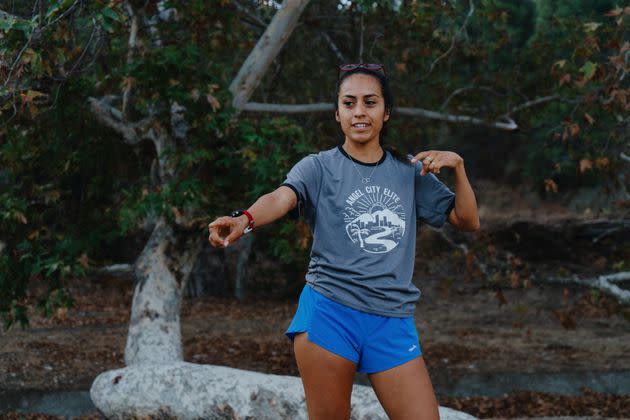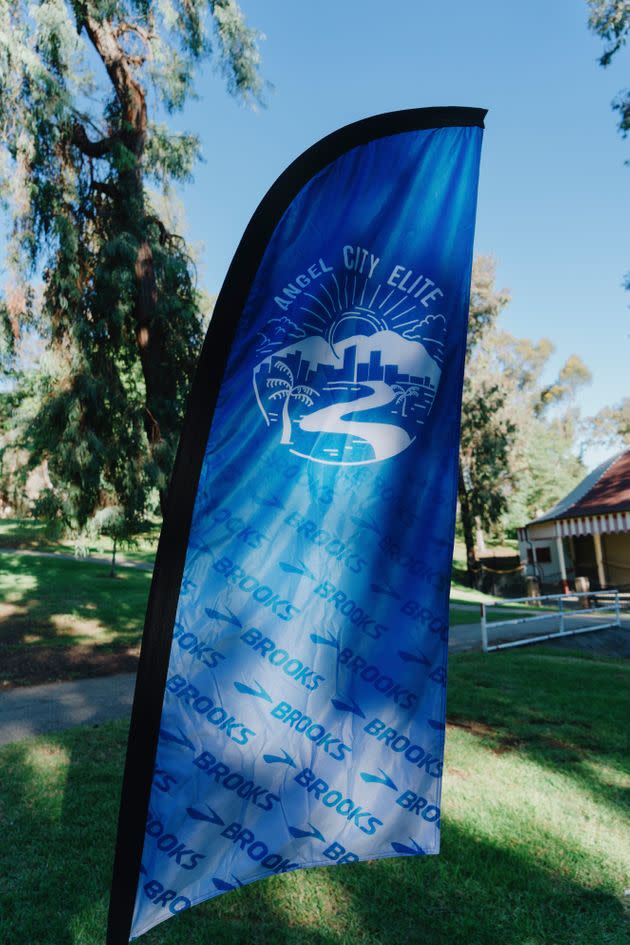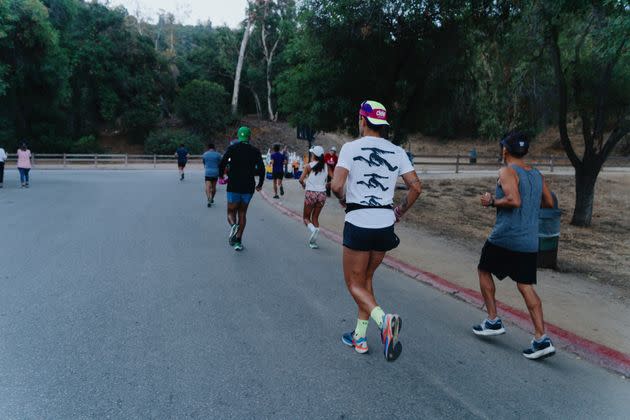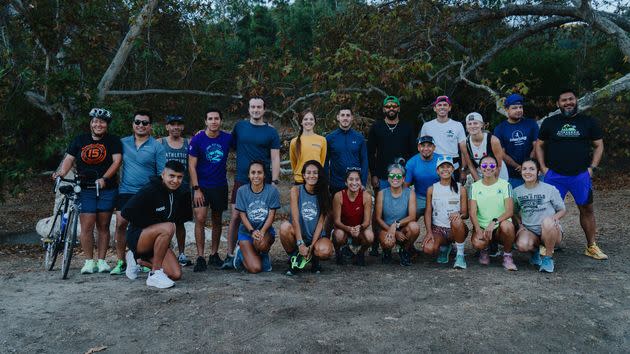The Running World Is Still Too White. These Latina Runners Are Changing That.

From left: ACE Team members Andrea Guerra, Grace Gonzalez and Grace Zamudio. (Photo: Nolwen Cifuentes for HuffPost)
On a particularly energizing night in Los Angeles, a panel of runners of color convened to discuss identity and athleticism. Among the group that came to hear them speak was a 6-year-old by the name of Colette, who was having trouble with bullies at school — some kids were ridiculing her brown skin. Her mother, Jinghuan Liu Tervalon, brought her to the event in hopes of encouraging a sense of pride in her ethnicity, and the confidence to recognize that darker skin signifies beauty and strength, not weakness.
“I was like, ‘Oh my god — it starts that early,’” Liu Tervalon said, about the racist and colorist behavior of Colette’s offending classmates. But Colette became invested in the panelists’ positivity immediately. A panelist representing Angel City Elite, a women’s distance running team based out of LA, caught her attention.
“She looks like me!” she told her mom. “Her skin color looks like mine. Her hair looks like me.” It was a very touching moment, Liu Tervalon recalled.
As we most recently learned from trending videos showing Black children reacting to Halle Bailey star as Ariel in the reboot of Disney’s “The Little Mermaid,” representation is crucial to a child’s perception of the world around them. To feel seen, you’ve got to be able to see those who look like you in positions of power, exercising their right to joy.
Angel City Elite, known among friends and fans as ACE, is on a mission to increase BIPOC visibility in distance running. The team, comprising Latina runners, competes in marathons at the highest level in the hopes of qualifying for the Olympics. They also spend time educating youth and the running community at large about their experiences in a predominantly white sport — which is how they ended up partnering with Brooks and gaining an even larger platform.

Team member Grace Zamudio explains the route at a recent ACE run in Los Angeles. (Photo: Nolwen Cifuentes for HuffPost)
Sabrina De La Cruz, a 31-year-old Mexican-American Alhambra resident of Mexican, created ACE in March of 2020 after she witnessed a lack of BIPOC representation as a competitor in the U.S. Olympic marathon trials. And it wasn’t just her who noticed. That same year, The New York Times reported 92% of the runners at the trials were white, 1% Black, 1% Asian, and 5% “other.” The racial disparities pushed De La Cruz and her friends to form a team. “I was like, this needs to change … there needs to be more color out here,” she said.
Demographics may vary depending upon where you are in the country but the data generally reveals an overwhelming whiteness in the sport. To even begin to examine why the lack of Black and brown women in elite running, in particular, is a complex process, the nonprofit organization Running Industry Diversity Coalition continues to research racial diversity in collectives, as well as identify barriers, and provide strategies to meet BIPOC needs.

The Angel City Elite team sign at Griffith Park in Los Angeles. (Photo: Nolwen Cifuentes)
For decades, community-based organizations such as the National Black Marathoners Association, Black Girls Run and Harlem Run, among many others, have been raising awareness and engaging communities of color in running. They help to create safe, comfortable places for communities to train and race together, according to Road Runners Club of America CEO Jean Knaack.
Running has long been touted as an egalitarian sport; there’s no need for expensive equipment, for one. But long-distance running can be a different experience. To prepare the body to sustain a marathon takes time and training with a legitimate coach. Money for travel for competition, equipment and entry into races is necessary. Experts tell me that running-related sponsorships and grants post-college are hard to secure in an individualized sport that does not have the same national attention paid to it nor frequent competition as football or basketball.

The team starts their run at Griffith Park in Los Angeles. (Photo: Nolwen Cifuentes for HuffPost)
Runners generally get their start on high school track and field or cross country teams, like in De La Cruz’s case. But she said that the expectation of some Hispanic kids to support their families financially doesn’t give them the opportunity to turn a talent into a career, or even a prospect that can land them at a “good” college.
She and her squad want to shift the tide to ensure more kids have the opportunity to go the distance. ACE hosts events for middle schoolers and high schoolers where they donate gear like running shoes and sports bras, offer guidance and answer questions about marathons. The students have always been responsive, even sending them cards expressing gratitude for sharing their knowledge.
“I’m not running for myself anymore. I’m running for the team’s mission of increasing representation in our sport,” said 29-year-old Grace Zamudio, a Mexican-American ACE teammate who is also a paralegal at an LA law firm. When Zamudio was a student, she recalls often being the darkest kid in the room. She said the spike in social justice movements in 2020 encouraged her to reflect on how that experience impacted her.

The team congregates for snacks and socializing after their run at Griffith Park. (Photo: Nolwen Cifuentes for HuffPost)
Zamudio found both agency and peace in the idea that running was a part of her identity — and that it could provide opportunities to learn more about others and their cultural backgrounds. “When you are out on a run with someone, so many barriers come down and you really open up with whomever you’re running with,” she said.
It’s important to note the mental health benefits of cardio, especially for disenfranchised groups in this country who are often systematically denied sufficient health care. De La Cruz, a case manager who works with children with autism, says that running helped her through postpartum depression. She ran for seven months of her pregnancy and, after giving birth, felt extremely unmotivated to train again. When she ultimately was able to get out there again, it felt like a potent form of therapy.

The whole group at the community run at Griffith Park. (Photo: Nolwen Cifuentes for HuffPost)
The team, who rallied around her, encouraged De La Cruz to be consistent with her race schedule. Now, her son is a year old and she is taking it a day at a time. She motivates herself with self-talk and music, and she lays out her clothes the day before a run (which, by the way, is a therapist-endorsed technique to motivate yourself to get active when you’re not feeling it).
And while self-motivation is crucial, community is truly everything. De La Cruz says that the collective’s level of support and motivation ultimately encourages her, every day, to achieve and move forward.
“It’s been really hard, but I think just having my husband [her coach], having these girls, having my family, all of us working together has been very helpful and motivating for me for this season,” she said.
ACE is currently training to compete in the California International Marathon in Sacramento on Dec. 4. This is one race closer for them to qualify in the 2024 U.S. Olympic marathon trials. In preparation, they’re hosting community runs for people to connect and train with them once a month at different locations across Los Angeles, such as Griffith Park, that intend to share the positive influence running can have, especially when you feel like an outsider.
This article originally appeared on HuffPost and has been updated.

 Yahoo Sport
Yahoo Sport 



































































